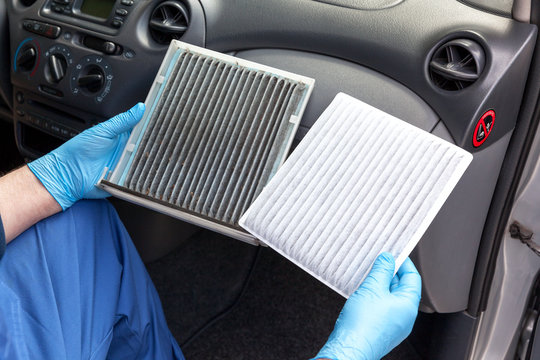Keeping your car's interior clean and healthy is essential, and your cabin pollen filter plays a crucial role in this. Let’s take a closer look at how this filter works, the importance of proper maintenance, and how First Stop can help improve your driving experience by making each journey cleaner and healthier.
Find your nearest First Stop
Breathe easy with a new cabin pollen filter from First Stop. Use our store locator to find your nearest First Stop and let’s get started.
What is a Cabin Pollen Filter?
A cabin pollen filter, also known as a cabin air filter, is a feature in your vehicle that filters out dust, pollen, pollution, and other airborne materials from the air entering your car's cabin. Positioned in the heating, ventilation, and air-conditioning (HVAC) system, the cabin filter’s primary function is to ensure that the air inside your vehicle is clean, creating a healthier and more comfortable environment for passengers.

The need for regular filter replacement
It’s important to regularly replace your cabin pollen filter. As you drive, the filter works tirelessly to trap dust, pollen, pollution, and other airborne materials, preventing them from entering your car's interior. However, over time, these filters can become clogged with the very particles they're designed to stop. This clogging can lead to a range of problems that affect both your vehicle's performance and your comfort.
A dirty filter means your car's air conditioning and heating systems have to work harder, which can reduce their efficiency and increase your fuel consumption. It can also lead to poor air quality inside your car, making the cabin feel stuffy and uncomfortable. For those with allergies or respiratory issues, the presence of pollen and other allergens can significantly impact their comfort during a drive. Regularly replacing the cabin pollen filter ensures that you breathe clean air, maintain optimal fuel efficiency, and enjoy a comfortable environment inside your vehicle.
How often should you change your cabin pollen filter?
Knowing when to change your cabin pollen filter isn't just about marking a date on the calendar. It's really about looking at how and where you drive, because these factors can make a big difference in keeping your car's air clean. While the general rule of thumb is to swap out the filter every 15,000 to 25,000 miles or once a year, here are some reasons you might need to do it more often:
- Driving environment: Driving in places with a lot of dust, pollution, or pollen? That can make your filter work harder and get dirty faster. Whether it's busy city streets or dusty rural roads, your filter might need more frequent changes.
- Usage: The more you're out and about with your car, especially with the air or heat on, the quicker your filter can fill up. If you clock up plenty of miles each year, keeping an eye on your filter is a good idea.
- Allergies or respiratory conditions: For anyone with allergies, asthma, or other conditions that make breathing a bit tougher, clean air in the car isn't just nice to have—it's essential.
Vehicle manufacturers recommend replacing your cabin air filter every 15,000 to 25,000 miles, or once a year depending on what is stated in your vehicle’s manufacturer manual.
FAQs about cabin pollen filters
What does a cabin pollen filter do?
A cabin pollen filter acts like a shield for your car's interior, capturing dust, pollen, pollution, and other particles from the air before it enters the cabin. This keeps the air you breathe inside the car cleaner and healthier.
What happens if you don't change the pollen filter in a car?
Not changing your cabin pollen filter can lead to a buildup of pollutants and allergens inside your car, affecting the air quality and potentially leading to health issues for passengers. A clogged filter can also strain your car's HVAC system, reducing efficiency and leading to potential repairs.
What is the difference between a cabin filter and a pollen filter?
The terms "cabin filter" and "pollen filter" both refer to the same component that filters the air entering your car's interior.
How long should a pollen filter last?
A pollen filter's lifespan can vary, but it's typically recommended to replace it every 15,000 to 25,000 miles or annually. Factors such as driving conditions and frequency of use can affect how quickly the filter becomes clogged and needs replacement.
Does a dirty cabin air filter affect heating?
Yes, a dirty cabin air filter can impact your car's heating and cooling systems. A clogged filter restricts airflow, making it harder for your car to regulate temperature efficiently. This can lead to your car's interior taking longer to heat up or cool down.
What are the benefits of changing your cabin pollen filter?
A pollen filter improves the air quality inside your car by filtering out harmful pollutants, allergens, and dust, which is especially beneficial for people with allergies or respiratory issues. It also helps protect the efficiency and longevity of your car's HVAC system by preventing clogs and ensuring smooth operation.
Is a pollen filter included in car servicing?
Yes, a pollen filter check is included in all three of our car servicing options: interim, full, and major. You can learn more about the differences between these services here.
Cabin pollen filter replacements at First Stop
Keep your cabin healthy and welcoming by keeping your pollen filter in top condition. Visit your nearest First Stop Centre for a comprehensive filter check or replacement. Our professionals are ready to help, so swing by your nearest First Stop Centre for a check-up.